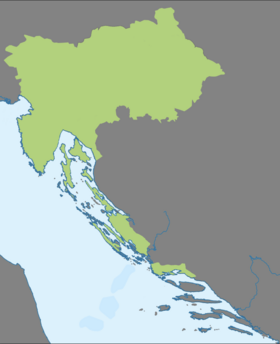Zemljask
| Zemljask | |
|---|---|
| Reć Zemljska | |
| Pronunciation | [ret͡ɕ zémʎska] |
| Created by | Aleisi Galan |
| Setting | Slovenia, Northern Croatia |
| Native to | The State of Zemlia, Illyria-Zemlia (RI&Z) |
Early form | Old Zemljask
|
Standard form | Standard Zemljask
|
Dialects |
|
| Official status | |
Official language in | Illyria-Zemlia (RI&Z) |
| Regulated by | The Council of the Zemljask Language (Rozjana Zemljska Reći) |
Borders of the Zemljask language (Mladźe Zemljska Reći) | |
Zemljask (autoglossonym: reć zemljska; Zemljask: [ret͡ɕ zémʎska]) is an isolate Slavic language with strong influence from Vulgar Latin, Italian, but most of all Illyrian, the Latin-derived language to the south which historically controlled Zemlia until the Illyrian Civil War of 1978-1982. After this war, Zemlia became an independent country, with Zemljask as its sole official language, while Illyrian was relegated to regional minority status soon after the conclusion of the conflict.
While its vocabulary derives for the most part from Proto-Slavic, Latin influence is most notable in its grammar, as well as the colloquial speech of the southern regions.
Etymology
In English, the name of the language, Zemlian (officially Zemljask) derives directly from the name of the country - Zemlia. This name, in turn, derives from Zemljask "Zemlja", meaning land. This is a shortening of the traditional, now patriotic, Naša Zemlja (lit. our land) which, over time, became simply Zemlia. The name for the language is a derivative of this, being composed of the roots zemľa+-ьskъ, forming Zemľьskъ, which evolved into the modern Zemljask.
